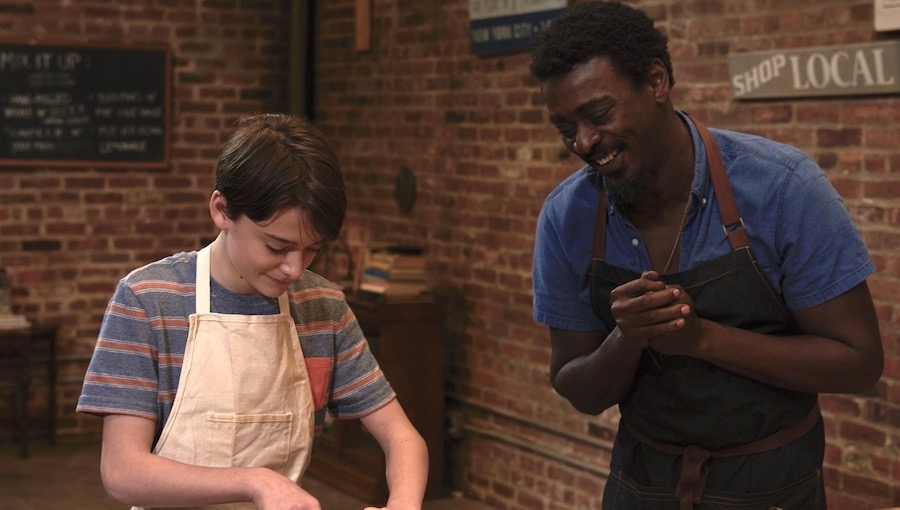When I first heard about this movie, I thought I had a pretty good idea of what it would be like: a young, talented chef saves himself, his family, and possibly the world, through the Power of Food™. That’s not what this film is. Instead, it’s something a good deal deeper, and a good deal more real.
Abe (Noah Schnapp, Stranger Things) is, indeed, a young and talented chef. 12 years old, he cares more about food than he does about having friends or any kind of social life. His home life is divisive to say the least. His father’s family is Palestinian Muslim. His mother’s family is Israeli Jewish. His father is an atheist intellectual. And his mother is the embodiment of “spiritual but not religious.” All of them are adamant that all the others are wrong, and all of them are quite insistent that Abe choose their side over anyone else’s.
Abe, meanwhile, would rather take the same approach to religion that he takes to food: Why not try a little bit of everything? Imagine his surprise when he hears about a local street vendor (Seu Jorge) with a similar philosophy: mixing different cultures and different cuisines to bring people together. And imagine the street vendor’s surprise when 12-year-old Abe shows up at his kitchen and asks to be mentored.
Often in movies like this, when a child has a particular talent for something, they’re treated as a prodigy, already head and shoulders above even the seasoned veterans in the field. Experts who see their work will have nothing but praise for it, from the very beginning. One of the things I like about this movie is that it doesn’t go that route.
Abe is a talented cook, sure, but he’s still a kid, still just learning. He frequently makes mistakes. In fact, I identify quite a bit with Abe myself in this regard. I started cooking when I was 11. Much like Abe, some of the stuff I made was great, but there were also a fair few screwups and missteps. Much like Abe, I was nowhere near professional level, but still quite a bit beyond the overly simple, sometimes patronizing “kid-level” cooking programs that my family kept trying to steer me towards. And, much like Abe, no one understood why I preferred to make my own birthday cake, even when it didn’t turn out the way it was supposed to.
This is the level where Abe is. He’s talented, but he’s not some superhuman, epicurean prodigy (even when he thinks he is). When Chico, the street vendor, agrees to train him, it’s not because he’s so very special. It’s because he’s persistent and determined.
Abe’s training is more realistic, too. It starts not with a chef’s knife, a saucepan, and a refrigerator full of gourmet ingredients, but rather with taking out the trash and other grunt work that the rest of the kitchen staff doesn’t have time for.
Meanwhile, Abe also tries to learn about both Jewish and Muslim religious traditions—including traditional foods. His Jewish grandfather (Mark Margolis) and Muslim grandmother (Salem Murphy) are each happy to share their culture and history, as long as that’s the only one Abe chooses. If either side sees Abe trying to take part in the other’s religion, there’s hell to pay.
Noah Schnapp gives a great performance, imbuing Abe with a sense of depth and nuance as he tries to balance both sides of his family. There aren’t a lot of actors his age who could carry a film like this, but Noah is one of them. Other standout performances include Seu Jorge, who makes the rather unlikely friendship between Abe and Chico believable, and Mark Margolis, who’s great in just about everything he does.
What makes this a film worth watching is its sense of realism. In terms of religion, neither side is presented as right or wrong, but both are treated with respect by the filmmakers and presented accurately. Likewise, there are no good guys or bad guys in this film—just real people.
No one is sympathetic all the time. Abe’s parents can be a bit dismissive of who he is and what he wants, but they still care about him very much and try to do what’s best for him, even if they don’t always succeed. Abe’s Jewish grandfather and Muslim grandmother can both seem quite harsh when trying to force Abe to choose their religion over the other’s; however, it comes from a place of love and wanting to pass on their cherished traditions to their grandson, particularly when each of their own children (Abe’s parents) has rejected those traditions.
Even Abe himself isn’t sympathetic all the time. He’s headstrong, he’s full of himself, and he thinks he’s a lot more mature than he actually is. Still, he’s very much a product of his environment in that respect. Also, he’s 12 years old, and 12-year-olds are often like that. It’s that realism throughout that makes this film so compelling, and what makes it a story that matters.
Will Abe save his family through the Power of Food™? That’s not the kind of film this is. Things are never so simple. But maybe, just maybe, as he learns more about both food and religion, Abe can learn to navigate both those worlds and, hopefully, find his own way.
Creative Team: Fernando Grostein Andrade (director, story), Lameece Issaq (screenplay, story), Jacob Kader (screenplay, story), and Christopher Vogler (story)
Released By: Blue Fox Entertainment
Available digitally and on demand here.

